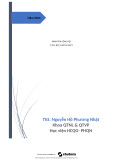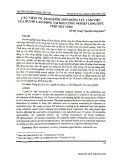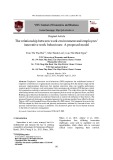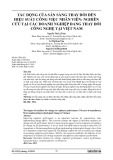
http://www.iaeme.com/IJM/index.asp 50 editor@iaeme.com
International Journal of Management (IJM)
Volume 8, Issue 1, January – February 2017, pp.50–61, Article ID: IJM_08_01_007
Available online at
http://www.iaeme.com/ijm/issues.asp?JType=IJM&VType=8&IType=1
Journal Impact Factor (2016): 8.1920 (Calculated by GISI) www.jifactor.com
ISSN Print: 0976-6502 and ISSN Online: 0976-6510
© IAEME Publication
A STUDY ON STRESS MANAGEMENT IN VARIOUS
SECTORS IN INDIA
Dr. V. Antony Joe Raja
HOD, Department of Management, Sri Muthukumaran Institute of Technology,
Chikkarayapuram, Chennai, Tamil Nadu, India
V. Vijayakumar
MCA, Software Engineer, iPLON India Pvt Ltd, Chennai, India
ABSTRACT
Stress is the “wear and tear” our minds and bodies experience as we attempt to cope with our
continually changing environment. Stress mainly occurs when the pressure is greater than the
resource. Stress is not something bad but it all depends on how we take it, Most of the stress we
experience is self-generated. It is generated on how we perceive life, whether an event makes us
feel threatened or stimulated, encouraged or discouraged, happy or sad depends to a large extent
on how we perceive ourselves. Self-generated stress is something of paradox, because so many
people think of external causes when they are upset. But one should recognize that we create most
of our own upsets in our daily life through our way of responding to things in a negative way which
may be due to lack of awareness or our inability to perceive things as they are ought to be.
Key words: Stress Management, Employees.
Cite this Article: Dr. V. Antony Joe Raja and V. Vijayakumar, A Study on Stress Management in
Various Sectors in India. International Journal of Management, 8(1), 2017, pp. 50–61.
http://www.iaeme.com/IJM/issues.asp?JType=IJM&VType=8&IType=1
1. INTRODUCTION
1.1. What Is Stress?
Stress is the reaction that people experience due to excessive pressures or other types of demand placed
upon them. It arises when they worry that they can’t cope. Stress is the “wear and tear” our minds and
bodies experience as we attempt to cope with our continually changing environment.
1.2. Definition
S = P > R --- Stress occurs when the pressure is greater than the resource.
FEELINGS OF STRESS is caused, when people are Worried Tensed Tired Frightened Elated
Depressed Anxious Anger at this juncture, there is a need to discuss about the principle given by Stephen
Covey, one of the management gurus which narrate us a situation about how a man makes 90% of his day
stressful due to his way of reaction to a small 10% of uncontrollable event happened to him in the

A Study on Stress Management in Various Sectors in India
http://www.iaeme.com/IJM/index.asp 51 editor@iaeme.com
morning.10% of life is made up of what happens to you. 90% of life is decided by how you react. The
education sector in India is evolving, led by the emergence of new niche sectors like vocational training,
finishing schools, sector – specific programmes and e-learning. The Indian education system, considered as
one of the largest in the world, is divided into two major segments of core and non-core education. While
schools and higher education constitute the core group, the non-core business consists of pre-schools,
vocational training and coaching classes. India has emerged as a strong potential market for investments in
training and education sector, due to its favorable demographics (young population) and being a services-
driven economy. Higher education is not immune to this problem. According to the St. Louis Psychologists
and Counseling Information and Referral, the process of stress management is one of the keys to a happy
and successful life in modern society. Although life provides numerous demands that can prove difficult to
handle, stress management provides a number of ways to manage anxiety and maintain overall well-being.
2. CHARACTERISTICS
The Characters of Stress can be mainly classified into two major factors:
1) External. 2) Internal.
2.1. External Stressors
• Physical Environment (• Noise• Bright Lights• Heat• Confined Spaces)
• Social Interaction (• Rudeness• Bossiness• Aggressiveness by others• Bullying)
• Organizational (• Rules• Regulations)
• Major Life Events ((• Birth• Death• Lost job• Promotion• Marital status change
• Daily Hassles (• Commuting• Misplaced keys• Mechanical breakdowns
• “Red - Tape”• Deadlines
2.2. Internal Stressors
• Lifestyle choices (• Caffeine• Lack of sleep• Overloaded schedule• Negative self - talk)
• Mind traps (• Unrealistic expectations• Taking things personally•
• Personality traits (• Perfectionists• Workaholics• Exaggeration• Rigid thinking
• Negative Self Talk (• Pessimistic thinking• Self criticism• Over analysing
The overall purpose of this analysis is to gain a better understanding of the phenomenon of stress
among scholars in tertiary education. Teachers’ work has always been considered to be very stressful. The
aim of this research has been to find out how they combat stress operatively and strategically in a
educational institution. The case study method was used and data was collected in interviews /
questionnaires. This paper gives an in-depth insight into this issue in a context of education institution the
study examined the impact of academic stress among the students. Stress management encompasses
techniques to equip a person with effective coping mechanisms for dealing with psychological stress.
Students have different expectations, goals and values that they want to fulfill, which is only possible if
they are integrated with that of the institution. Taking into account the present level of stress, sources of
stress, the stress management techniques should be introduced that would be useful for the students. The
various criteria like physical, psychological, individual, demographical and environmental factors of stress
also should be taken for account the stress levels among the students.
3. MATERIALS AND METHODS
In the rest of this section of Mind Tools, we look at some important techniques in each of these three
groups. Stress can cause severe health problems and, in extreme cases, can cause death. While these stress
management techniques have been shown to have a positive effect on reducing stress, they are for
guidance only, and readers should take the advice of suitably qualified health professionals if they have

Dr. V. Antony Joe Raja and V. Vijayakumar
http://www.iaeme.com/IJM/index.asp 52 editor@iaeme.com
any concerns over stress-related illnesses or if stress is causing significant or persistent unhappiness.
Health professionals should also be consulted before any major change in diet or levels of exercise. Stress
is a normal psychological and physical reaction to the ever increasing demands of life. Surveys show that
most Americans experience challenges with stress at some point during the year. In looking at the causes
of stress, remember that your brain comes hard-wired with an alarm system for your protection. When your
brain perceives a threat, it signals your body to release a burst of hormones to fuel your capacity for a
response. This has been labeled the "fight-or-flight" response. Once the threat is gone, your body is meant
to return to a normal relaxed state. Unfortunately, the nonstop stress of modern life means that your alarm
system rarely shuts off. That's why stress management is so important. Stress management gives you a
range of tools to reset your alarm system. Without stress management, all too often your body is always on
high alert. Over time, high levels of stress lead to serious health problems. Don't wait until stress has a
negative impact on your health, relationships or quality of life. Start practicing a range of stress
management techniques today. A lot of research has been conducted into stress over the last hundred years.
Some of the theories behind it are now settled and accepted; others are still being researched and debated.
During this time, there seems to have been something approaching open warfare between competing
theories and definitions: Views have been passionately held and aggressively defended.
NOW we will examine four common types of stress, and we'll discuss how it could manage each of
them more effectively.
3.1. Time Stress
You experience time stress when you worry about time, or the lack thereof.
You worry about the number of things that you have to do, and you fear that you'll fail to achieve
something important. You might feel trapped, unhappy, or even hopeless. Common examples of time
stress include worrying about deadlines or rushing to avoid being late for a meeting.
3.1.1. Managing Time Stress
Time stress is one of the most common types of stress that we experience today. It is essential to learn how
to manage this type of stress if you're going to work productively in a busy organization. First, learn good
time management skills. This can include using To-Do Lists or, if you have to manage many simultaneous
projects, Action Programs. Next, make sure that you're devoting enough time to your important priorities.
Unfortunately, it's easy to get caught up in seemingly urgent tasks which actually have little impact on
your overall objectives. This can leave you feeling exhausted, or feeling that you worked a full day yet
accomplished nothing meaningful. Your important tasks are usually the ones that will help you reach your
goals, and working on these projects is a better use of your time. Our article on The Urgent/Important
Matrix explains how to balance urgent and important tasks, and our article on prioritization helps you
separate tasks that you need to focus on from those you can safely put off. If you often feel that you don't
have enough time to complete all of your tasks, learn how to create more time in your day. This might
mean coming in early or working late, so that you have quiet time to focus. You should also use your peak.
working time to concentrate on your most important tasks – because you're working more efficiently, this
helps you do more with the time you have. For instance, if you're a morning person, schedule the tasks that
need the greatest concentration during this time. Our article "Is This a Morning Task" helps you learn how
to prioritize your tasks and schedule them during your most productive times of day. You can leave less
important tasks, like checking email, for times when your energy levels drop. Also, make sure that you're
polite but assertive about saying "no" to tasks that you don't have the capacity to do.
3.2. Anticipatory Stress
Anticipatory stress describes stress that you experience concerning the future. Sometimes this stress can be
focused on a specific event, such as an upcoming presentation that you're going to give. However,

A Study on Stress Management in Various Sectors in India
http://www.iaeme.com/IJM/index.asp 53 editor@iaeme.com
anticipatory stress can also be vague and undefined, such as an overall sense of dread about the future, or a
worry that "something will go wrong."
3.2.1. Managing Anticipatory Stress
Because anticipatory stress is future based, start by recognizing that the event you're dreading doesn't have
to play out as you imagine. Use positive visualization techniques to imagine the situation going right.
Research shows that your mind often can't tell the difference, on a basic neurological level, between a
situation that you've visualized going well repeatedly and one that's actually happened. Other techniques –
like meditation – will help you develop focus and the ability to concentrate on what's happening right now,
rather than on an imagined future. Consider setting aside time daily – even if it's only five minutes – to
meditate. Anticipatory stress can result from a lack of confidence. For example, you might be stressing
over a presentation that you're giving next week, because you're afraid that your presentation won't be
interesting. Often, addressing these personal fears directly will lower your stress. In this example, if you
put in extra time to practice and prepare for tough questions, you'll likely feel more prepared for the event.
Last, learn how to overcome a fear of failure: by making contingency plans and analyzing all of the
possible outcomes, you'll get a clearer idea of what could happen in the future. This can help diminish your
fear of failure and give you a greater sense of control over events.
3.3. Situational Stress
You experience situational stress when you're in a scary situation that you have no control over. This could
be an emergency. More commonly, however, it's a situation that involves conflict, or a loss of status or
acceptance in the eyes of your group. For instance, getting laid off or making a major mistake in front of
your team are examples of events that can cause situational stress.
3.3.1. Managing Situational Stress
Situational stress often appears suddenly, for example, you might get caught in a situation that you
completely failed to anticipate. To manage situational stress better, learn to be more self-aware. This
means recognizing the "automatic" physical and emotional signals that your body sends out when you're
under pressure. For example, imagine that the meeting you're in suddenly dissolves into a shouting match
between team members. Your automatic response is to feel a surge of anxiety. Your stomach knots and
feels bloated. You withdraw into yourself and, if someone asks for your input, you have a difficult time
knowing what to say. Conflict is a major source of situational stress. Learn effective conflict resolution
skills, so that you're well-prepared to handle the stress of conflict when it arises. It's also important to learn
how to manage conflict in meetings, since resolving group conflict can be different from resolving
individual issues. 7 Everyone reacts to situational stress differently, and it's essential that you understand
both the physical and emotional symptoms of this stress, so that you can manage them appropriately. For
instance, if your natural tendency is to withdraw emotionally, then learn how to think on your feet and
communicate better during these situations. If your natural response is to get angry and shout, then learn
how to manage your emotions.
3.4. Encounter Stress
Encounter stress revolves around people. You experience encounter stress when you worry about
interacting with a certain person or group of people – you may not like them, or you might think that
they're unpredictable. Encounter stress can also occur if your role involves a lot of personal interactions
with customers or clients, especially if those groups are in distress. For instance, physicians and social
workers have high rates of encounter stress, because the people they work with routinely don't feel well, or
are deeply upset. This type of stress also occurs from "contact overload": when you feel overwhelmed or
drained from interacting with too many people.

Dr. V. Antony Joe Raja and V. Vijayakumar
http://www.iaeme.com/IJM/index.asp 54 editor@iaeme.com
3.4.1. Managing Encounter Stress
Because encounter stress is focused entirely on people, you'll manage this type of stress better by working
on your people skills. To find out how good your people skills are, take our quiz, and discover the areas
that you need to develop. A good place to start is to develop greater emotional intelligence. Emotional
intelligence is the ability to recognize the emotions, wants, and needs of yourself and of others. This is an
important skill in interacting with others and in building good relationships. It's also important to know
when you're about to reach your limit for interactions in the day. Everyone has different symptoms for
encounter stress, but a common one is withdrawing psychologically from others and working
mechanically. Another common symptom is getting cranky, cold, or impersonal with others in your
interactions. When you start to experience these symptoms, do whatever you can to take a break. Go for a
walk, drink water, and practice deep breathing exercises. Empathy is a valuable skill for coping with this
type of stress, because it allows you to see the situation from the other person's perspective. This gives you
greater understanding and helps you to structure your communications so that you address the other
person's feelings, wants, and needs. The first step in successful stress relief is deciding to make a change in
how you manage stress. The next step is identifying your stress triggers. Some causes of stress are obvious
job pressures, relationship problems or financial difficulties. But daily hassles and demands, such as
commuting, arranging day care or being overcommitted at work, can also contribute to your stress level.
Positive events also can be stressful. If you got married, started a new job and bought a new house in the
same year, you could have a high stress level. While negative events in general are more stressful, be sure
to also assess positive changes in your life. Once you've identified your stress triggers, you can start
thinking about strategies for dealing with them. Sometimes the solution may be as easy as turning off the
TV when the evening news is too distressing. Or, when you can't avoid a stressful situation, try
brainstorming ways to reduce the irritation factor. And don't feel like you have to figure it out all on your
own. Seek help and support from family and friends. You may want to ask them what stress-relief
techniques have worked well for them. And many people benefit from daily practice of stress reduction
techniques, such as mindfulness, tai chi, yoga,meditation or being in nature. Stress won't disappear from
your life. And stress management isn't an overnight cure. But with practice, you can learn to manage your
stress level and increase your ability to cope with life's challenges.
4. INDUSTRY PROFILE
Organisational interventions can be made at three different levels (Cox, et. al. 1990):
Primary: Remove hazard or reduce employees' exposure to it, or its impact on them.
Secondary: Improve the organisation's ability to recognise and deal with stress related problems as they
occur.
Tertiary: Help employees cope with and recover from work related problems In Britain under the
Management of Health and Safety at Work Regulations 1992, employers must assess risks to health and
safety and implement avoidance and control measures. Stress is a hazard that could be included in the risk
assessments and the avoidance and control measures are primary interventions which should be an
organisation's top priority. Unfortunately tertiary interventions help employees deal with the impact of
stress once they are suffering from it and include stress counseling or medical assistance such as
medication or surgery. Although these methods are important, they do not focus on removing the stressor.
REBT based stress management interventions which concentrate on the employees' appraisal of situations
and potential stressors are useful at both the secondary and tertiary intervention levels. However, one of the
goals of using REBT in industry would be prevent employees from becoming unnecessarily stressed in the
first place, and to be able to recognise the true source of stress i.e. is it from internal or external pressures.
Once this has been understood then the employee may be in a better position to deal with or change the
stressor. A common problem in industry are employees who hold rigid, inflexible, beliefs about
performing extremely well under all conditions as they are more likely to suffer from higher levels of
stress when compared to employees who hold more helpful flexible beliefs and standards. The so called











![20 câu hỏi Quản lý dự án phần mềm có đáp án [mới nhất]](https://cdn.tailieu.vn/images/document/thumbnail/2025/20251003/hieu2004haha@gmail.com/135x160/78791759734259.jpg)


![Tài liệu Quản lý dự án: Kiến thức nền tảng toàn diện [chuẩn SEO]](https://cdn.tailieu.vn/images/document/thumbnail/2025/20250910/kimphuong1001/135x160/92631757496585.jpg)











